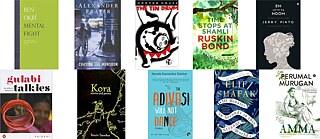Top 10
Blunders, Inspiration, and Lasting Literature
Mistakes often serve as inspiration for the stories that remain etched in our minds. In this listicle, Nirmala Govindarajan delves into her favourite books that address the topic of mistakes.
As a reader, I am drawn to evocative stories that draw from political, personal, and historical blunders and straddle the intersection between prose and verse to create enduring works of literature.
A great work of literature is marked by the originality of a story written with linguistic finesse.
Language is as integral to storytelling as the plot is. It is true that everyone has a story to tell. It is also true that not every published author has the ability to write their story with literary merit. Fortunately, there are several literary gems that draw from the omissions of politics, history, gender, and biased normalcy. Sifting through literary works that draw from the vicissitudes of life, the books I present here are not just rich with literary talent, but are written by people who have endured mistakes that have driven them to tell the stories they have.
Here come my top ten literary gems about mistakes:
But I am not from Tibet
Never been there
Yet I dream
Of dying there
In his poem “My Tibetanness,” Tenzin Tsundue questions the status of Tibetan refugees in India, or anywhere else in the world for that matter. Fraught with emotion yet told with simplicity, Kora, a collection of poems and essays by Tsundue, calls the world’s attention towards the complexity of the Tibetan refugee situation.
Set against the backdrop of riots in Gujarat, “They Eat Meat” is the first story from a collection of ten narratives that shed light on the discrimination an Adivasi (Indigenous person) in India faces. Written from an insider’s perspective, the author Hansda Sowvendra Shekhar uses simple language to deliver eloquent stories in his award-winning collection The Adivasi Will Not Dance.
Written in Tamil and translated into English, Amma is a collection of 22 non-fiction pieces by Perumal Murugan that highlights the life of his mother. My personal favourite in the collection is “An Invitation from the Moon,” where Murugan’s mother, with one child on her back and the other holding her hand, locks up her drunk husband and wanders by the moonlight into the fields to weed them. Amma is a celebration of a gritty rural woman.
While stories of prostitutes have often been told, Elif Shafak’s stylistic presentation of the subject set in Istanbul is intriguing, with the protagonist recalling her entire life in the 10 minutes 38 seconds left for her to pass on to the next world.
Shortlisted for the 2020 Booker Prize, this novel takes you through the sights, sounds, and smells of a life lived through its protagonist Tequila Leila.
Set in a small town in Karnataka, the short story Gulabi Talkies takes the reader through the opening of a theatre and the ensuing emancipation of women. Originally written in Kannada by Vydehi, this collection of twenty short stories translated into English holds a mirror to the ordinariness of the lives of people in small-town India. Her poetic prose, set in rural South India, casts light on the resilience of its people in the face of sorrow and poverty.
Mental illness is real in societies like India where the word “psychiatrist” is considered taboo by many. Opening in the psychiatric ward of JJ Hospital, Bombay, the reader immediately gets acquainted with Imelda and her family. Her son, who is listening to her, and her husband, whom she calls Angel Ears because “his ears are the sweetest thing about him.”
Em and the Big Hoom by Jerry Pinto is an award-winning novel that takes on the meter of a Bildungsroman through the deeply personal story of the writer’s adolescence.
Standing at his father’s grave, a young lad ponders the options to get out of the grave – via a root, a flower, and then as a seed carried away by a bird. Time Stops at Shamli begins with “The Funeral” and includes twenty other stories from small towns in the Himalayan regions, which the master storyteller Ruskin Bond narrates with simple genius, bringing magic into everyday happenings. For, as Bond says, the real India lies in its small towns.
The protagonist Oskar Matzerath, a dwarf, narrates this story from an asylum. Matzerath takes the reader on a vivid journey through the birth and death of Nazi Germany, using elements of magic realism. The Tin Drum, a historical Bildungsroman by Günter Grass, lends itself fabulously to the visual medium with its award-winning film adaptation.
The light was a soft dusty grey.
While being treated for Arnold Chiari, a rare structural defect in the cerebellum, the author, Alexander Frater, meets a fellow patient, Mr. Baptista, in the hospital and learns that the monsoon will arrive in Kerala on June 1. Frater tells the doctor that he is going to India. Traversing the country and chasing the monsoon, Frater gains insight into the politics at the centre and the states. The politics of neighbouring countries, landscapes, superstitions, people, and unpredictable rains are all relayed in breathtaking prose in this autobiographical travelogue.
Individuals are, nations are,
Some civilisations are becoming so
But humanity isn’t …
As yesterday merges with today, epidemics, impending wars, and humans work relentlessly against humankind, animals, trees, birds, and bees. With each passing day, Mental Fight, an epic poem by Ben Okri, becomes more and more relevant.
A great work of literature is marked by the originality of a story written with linguistic finesse.
Language is as integral to storytelling as the plot is. It is true that everyone has a story to tell. It is also true that not every published author has the ability to write their story with literary merit. Fortunately, there are several literary gems that draw from the omissions of politics, history, gender, and biased normalcy. Sifting through literary works that draw from the vicissitudes of life, the books I present here are not just rich with literary talent, but are written by people who have endured mistakes that have driven them to tell the stories they have.
Here come my top ten literary gems about mistakes:
10. Kora
I am TibetanBut I am not from Tibet
Never been there
Yet I dream
Of dying there
In his poem “My Tibetanness,” Tenzin Tsundue questions the status of Tibetan refugees in India, or anywhere else in the world for that matter. Fraught with emotion yet told with simplicity, Kora, a collection of poems and essays by Tsundue, calls the world’s attention towards the complexity of the Tibetan refugee situation.
9. The Adivasi Will Not Dance
No one minds what we eat here… And we don’t mind what others eat…Set against the backdrop of riots in Gujarat, “They Eat Meat” is the first story from a collection of ten narratives that shed light on the discrimination an Adivasi (Indigenous person) in India faces. Written from an insider’s perspective, the author Hansda Sowvendra Shekhar uses simple language to deliver eloquent stories in his award-winning collection The Adivasi Will Not Dance.
8. Amma
Apparently, I weighed three and a half kilos at birth and remained chubby until I was four or five. “By the time I carried you to and back from a place, my hips would break,” Amma often complained, though her tone would give away her pride.Written in Tamil and translated into English, Amma is a collection of 22 non-fiction pieces by Perumal Murugan that highlights the life of his mother. My personal favourite in the collection is “An Invitation from the Moon,” where Murugan’s mother, with one child on her back and the other holding her hand, locks up her drunk husband and wanders by the moonlight into the fields to weed them. Amma is a celebration of a gritty rural woman.
7. 10 Minutes 38 Seconds in This Strange World
In the final seconds before her brain surrendered, Tequila Leila recalled the taste of a single malt whiskey.While stories of prostitutes have often been told, Elif Shafak’s stylistic presentation of the subject set in Istanbul is intriguing, with the protagonist recalling her entire life in the 10 minutes 38 seconds left for her to pass on to the next world.
Shortlisted for the 2020 Booker Prize, this novel takes you through the sights, sounds, and smells of a life lived through its protagonist Tequila Leila.
6. Gulabi Talkies
It was a town with only one street running through it, like a hair parting…Set in a small town in Karnataka, the short story Gulabi Talkies takes the reader through the opening of a theatre and the ensuing emancipation of women. Originally written in Kannada by Vydehi, this collection of twenty short stories translated into English holds a mirror to the ordinariness of the lives of people in small-town India. Her poetic prose, set in rural South India, casts light on the resilience of its people in the face of sorrow and poverty.
5. Em and the Big Hoom
I lost my faith, as an hourglass loses sand…Mental illness is real in societies like India where the word “psychiatrist” is considered taboo by many. Opening in the psychiatric ward of JJ Hospital, Bombay, the reader immediately gets acquainted with Imelda and her family. Her son, who is listening to her, and her husband, whom she calls Angel Ears because “his ears are the sweetest thing about him.”
Em and the Big Hoom by Jerry Pinto is an award-winning novel that takes on the meter of a Bildungsroman through the deeply personal story of the writer’s adolescence.
4. Time Stops at Shamli
Scattered words of condolence passed back and forth like dragonflies in the wind…Standing at his father’s grave, a young lad ponders the options to get out of the grave – via a root, a flower, and then as a seed carried away by a bird. Time Stops at Shamli begins with “The Funeral” and includes twenty other stories from small towns in the Himalayan regions, which the master storyteller Ruskin Bond narrates with simple genius, bringing magic into everyday happenings. For, as Bond says, the real India lies in its small towns.
3. The Tin Drum
When Mama died, the red flames on my drum casing paled a little, but the white lacquer became whiter than ever and so dazzling that Oskar was sometimes obliged to close his eyes.The protagonist Oskar Matzerath, a dwarf, narrates this story from an asylum. Matzerath takes the reader on a vivid journey through the birth and death of Nazi Germany, using elements of magic realism. The Tin Drum, a historical Bildungsroman by Günter Grass, lends itself fabulously to the visual medium with its award-winning film adaptation.
2. Chasing the Monsoon
Far away, I heard a noise like a deep ripping growl of thunder. After only a few heartbeats of lapsed time, I identified it, with sudden delight, as the roar of a distant tiger. At peace, I finally fell asleep… I was awakened atdawn by a screech of peacocks.The light was a soft dusty grey.
While being treated for Arnold Chiari, a rare structural defect in the cerebellum, the author, Alexander Frater, meets a fellow patient, Mr. Baptista, in the hospital and learns that the monsoon will arrive in Kerala on June 1. Frater tells the doctor that he is going to India. Traversing the country and chasing the monsoon, Frater gains insight into the politics at the centre and the states. The politics of neighbouring countries, landscapes, superstitions, people, and unpredictable rains are all relayed in breathtaking prose in this autobiographical travelogue.
1. Mental Fight
Is humanity exhausted?Individuals are, nations are,
Some civilisations are becoming so
But humanity isn’t …
As yesterday merges with today, epidemics, impending wars, and humans work relentlessly against humankind, animals, trees, birds, and bees. With each passing day, Mental Fight, an epic poem by Ben Okri, becomes more and more relevant.


